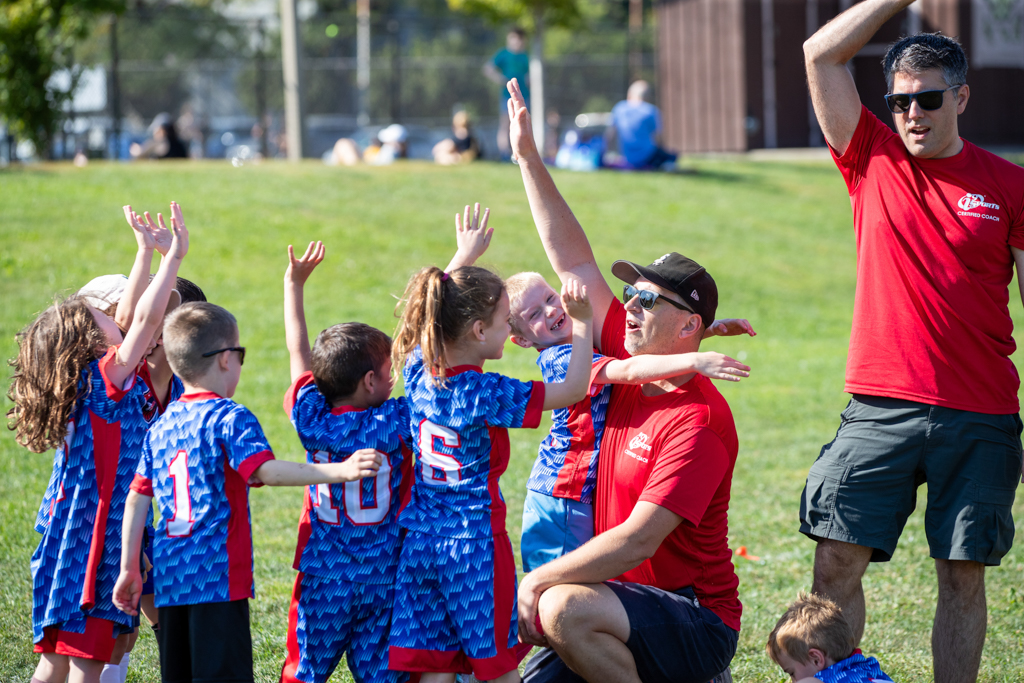Why Your Child Isn’t Missing Out by Skipping Travel or Club Sports
If you’ve spent any time on the sidelines, you’ve likely heard parents talk about travel or club teams— the cost, the weekend tournaments, and the idea that your child is missing out if they aren’t playing at a higher level at a young age. The reality is that your child isn’t missing out by not playing for a club or travel team. In fact, it’s likely better for their development if they skip those teams at a young age. Here’s why:
1. Scouts Aren’t Watching 8-Year-Olds. Ignore the pressure.
There’s a lot of pressure to have your child specialize in a sport at a young age; that age also seems to get younger every year. The reality is, college scouts and recruiters aren’t at games for younger age groups such as elementary school and middle school. They’re looking at high school athletes who are older, more developed, and much closer to applying to college. They’re also not looking at your child’s highlights as an 8-year-old, likely not even as a 13-year-old!
Stressing out about joining a travel team and capturing every play on video to post to a dedicated social media account is not the golden ticket to a college scholarship. The pathway to college recruitment is complex and extremely selective. Though it varies by sport, the overall chance of high school athletes receiving an athletic scholarship is only 6%. Depending on the sport, that number can even drop as low as 1-2%.
So, how can you actually give your child the best chance at playing sports in college or even beyond? It isn’t an expensive, time-consuming club team. The best thing you can do for your kids at this age is encourage strong fundamentals and support their love of the game.
2. Fundamentals Lead to Success More Than Trophies.
Professional players don’t get where they are because of a certain team, or highlights from when they were 8 years old. They reach elite levels because they fell in love with a sport. They loved it so much, they would do whatever it took to keep playing. In order to reach the more elite pathways, you need to find the key to what keeps your child playing longer.
This varies based on each child. Some children may thrive in more competitive leagues at a young age, and some may prefer to play for fun with their friends in a low- pressure environment. Regardless of what each child prefers, they all have one thing in common at those younger ages—fundamentals.
Kids need to develop fundamental movement including balance, coordination, and agility. Travel and club teams often emphasize winning and competition, but the long-term key to success in any sport is fundamental skills like dribbling, passing, throwing, catching, footwork, and understanding the flow of the game. Kids who master these basics recreationally are just as prepared, if not better than those on travel teams.
The other key to fundamentals is multi-sport participation. Balance, coordination, and agility are best learned by participating in multiple sports, not just one!
3. Multi-sport Participation is Better Than The Early Sport-Specialization in Club Sports.
Research shows that children who participate in multiple sports and delay specialization tend to have longer careers, lower injury rates, and higher overall athletic success. Playing different sports cross trains your child’s muscles. When you use the same muscle over and over again, you learn muscle memory but you also limit your body’s movements.
For example, if your child plays baseball year-round, they may have an immaculate swing because of muscle memory. But they likely lack cardiovascular endurance because there isn’t as much running in baseball as other sports. Instead of playing baseball year-round, you can let your baseball player try another sport such as soccer or basketball in the off-season. Sports like soccer or basketball will likely improve their speed, agility, and endurance. This would make them a multi-functional athlete, and can give them a leg up over kids that have been playing baseball year-round for 12+ years. This will also train their body to use similar muscles in different ways, helping to curb overuse injuries.
Multi-sport athletes are also more likely to reach elite levels of play. In a study published in The Physicians and Sportsmed Journal, 88% of first-round draft picks in the NFL between 2008 and 2017 were multi-sport athletes. Allowing your kids to explore and play different sports is a better path to longevity and elite recruitment than following the crowd and spending a quarter of their life playing one sport.
4. Life Skills That Last Beyond the Game are More Important Than Winning.
Many programs promise “elite” coaching and “exposure” for individuals, but in reality, they often prioritize winning over individual development. This pressure can negatively impact kids’ mental health and enjoyment of the game. Winning isn’t the priority in youth sports. The priority is mastering the fundamentals for child development and fostering a passion for sports and an active lifestyle.
Sports are about more than medals and rankings. Through youth sports, kids learn:
- Teamwork: How to communicate with and support others.
- Resilience: How to handle mistakes, losses, and setbacks.
- Confidence: How to believe in themselves and be comfortable trying new things despite the possibility of failure.
- Leadership: How to encourage others and set a good example.
These are the individual skills that matter on and off the field and will serve your child for the rest of their lives. Research confirms that positive youth sports environments build social, emotional, and leadership skills that transfer beyond athletics. The focus should be on long-term growth and development, not short-term, immediate success.
Programs that put fun and skill development before winning should be where you invest your time, energy, and money. This will allow your kids to perfect fundamentals, fall in love with the game, play sports longer, and learn transferable life skills that can be used beyond the game.
The Takeaway: You’re not holding your child back by skipping club sports at a young age.
Elite programs and organizations will sell you on exclusivity, short-term success, immediate gains, and ultimately take advantage of parents who simply want the best for their kids. They’ll tell you they are the best for your kids because they have the higher levels of competition and more elite coaching, but that’s not always “what’s best.”
By ignoring the pressure to join these intensive club or travel teams, you’re giving your kids a healthier, happier, and more balanced foundation to grow on. That said, some kids DO enjoy that level of competition and it fits their needs! For those more competitive kids, travel or club sports may be the best option. But don’t panic if your child isn’t one of these kids and would rather skip that route, it doesn’t mean they’re behind.
Remember to think about the long-term development of your child when choosing a youth sports program. Ultimately, the choice isn’t just about today’s wins, it’s about whether your child leaves the game with skills, confidence, and a passion that lasts a lifetime. Spoiler alert: you don’t have to join club or travel teams to achieve that.
About the Author

Tyler Munoz
Manager Of Sport, i9 Sports®
Tyler is responsible for creating and implementing national training programs for coaches and over 240 franchisees to achieve the company’s mission to help kids succeed in life through sports.
Tyler grew up in Modesto, California, playing baseball, basketball and football from the age of 5. Sports have always been at the center of his life and have been something that he has dedicated his life to making a positive impact in.
He discovered his passion - supporting coaches to ensure they can provide a quality sport experience to the athletes that they coach during his education at California State University, Fresno. He earned his Master of Arts in Kinesiology – Sport Psychology and his Bachelor of Arts in Political Science with a Minor in Sport Coaching from California State University, Fresno.
After graduating, Tyler spent a year in New Zealand and Australia, where he studied and participated in the two countries’ sport environments, athlete development systems, and coaching models.
After his travels, he joined the United States Olympic and Paralympic Committee’s (USOPC) Coaching Education Department as the American Development Model and Youth Development fellow. Tyler was able to collaborate and coordinate sport development projects with several National Governing Bodies and assist the Coaching Education team with creating and updating resources related to coach training and the American Development Model.
Tyler continued to consult with the USOPC on initiatives related to the American Development Model the Quality Coaching Framework and ultimately, developed an online course, Foundations of the American Development Model. In 2020, he accepted a position with USA Football as the Senior Manager of Coach Education.
During his three years there, he was able to redesign the organization’s coach education certification, which led to USA Football achieving its’ one millionth coach certification in 2022. Tyler has coached football, baseball, and basketball at all levels of sport (recreational, scholastic, national, and international) throughout his life and is passionate about giving back to the communities in which he has lived.
Presentations and Awards:
College of Health and Human Services- Outstanding Project Award
Presented graduate project at the 39th Annual Central California Research Symposium
Olympic & Paralympic Coach Magazine Spring 2020- ADM & Me: Insights in Learning from my USOPC Fellowship
Presented at the USA Football National Conference 2020
Presented at the National Post Olympic and Paralympic Conference of Sport & Science at the Wingate Institute in Israel
What Does Fun Look Like? - Interview with Athlete Era
